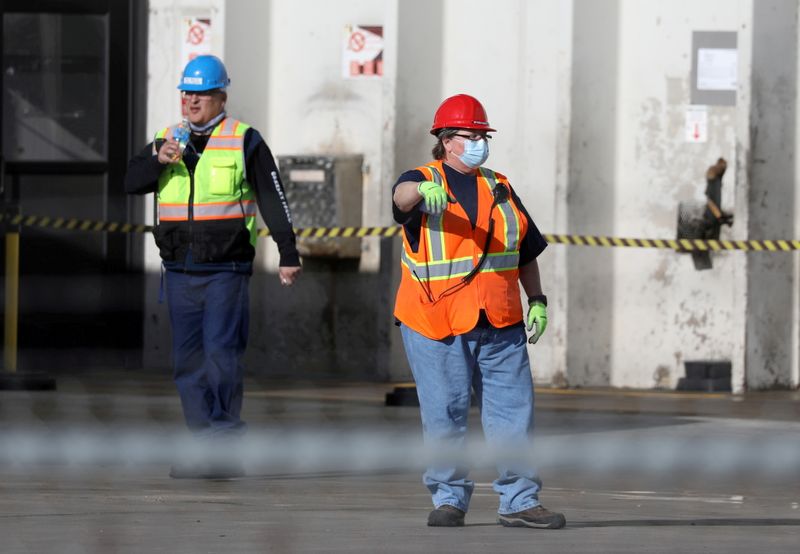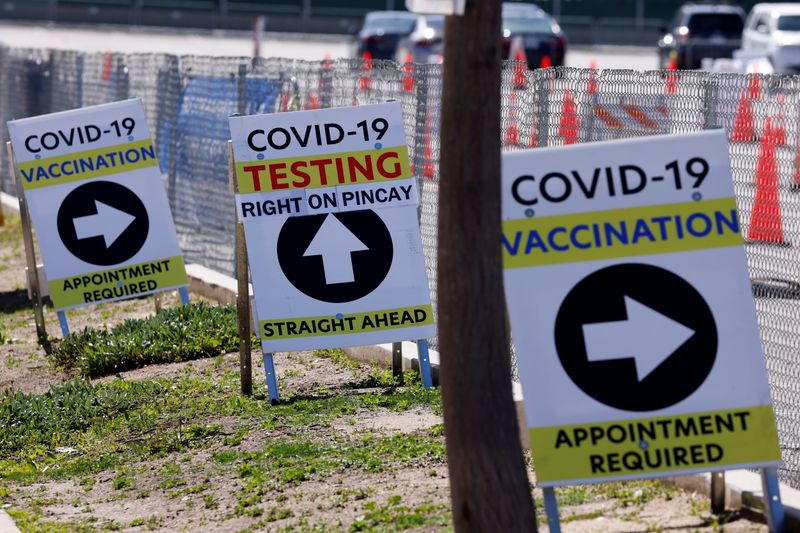By Leah Douglas
WASHINGTON (Reuters) -Workers at the leading U.S. meatpacking plants experienced cases and death from COVID-19 that were up to three times previous estimates, according to a report by the House Select Subcommittee on the Coronavirus Crisis seen by Reuters.
The U.S. House of Representatives subcommittee surveyed major meatpackers Tyson Foods (NYSE:TSN), JBS USA, Cargill, National Beef and Smithfield Foods, which together control over 80% of the beef market and 60% of the pork market in the United States.
At those companies’ plants, worker cases of COVID-19 totaled 59,147 and deaths totaled 269, based on counts through January of this year, according to the report which was released on Wednesday ahead of the subcommittee hearing on the pandemic's impact on meatpacking workers.
That is far higher than a previous estimate by the Food and Environment Reporting Network (FERN), which had been used by government agencies and media throughout the pandemic, according to the report. FERN had counted 22,694 cases and 88 deaths among workers at the five companies as of Sept. 8, primarily drawing on data from news reports and public health agencies.
"Until now, we have not had a full sense of how hard meatpacking workers were hit," U.S. Representative James Clyburn, chairman of the subcommittee, said in his opening statement at the hearing.
The meatpacking industry was especially hard hit by COVID-19 in part because its workers tend to be in close proximity for long hours in often messy conditions.
The new data comes from company calculations of worker cases primarily based on testing done within company facilities, meaning some infections identified through other health providers could have been excluded.
Cases were especially high at certain plants, including JBS’s Hyrum, Utah, beef plant and Tyson’s Amarillo, Texas, beef plant, where around 50% of workers contracted the virus, according to the report.
The subcommittee's findings also included new details of lax safety protocols at some of the plants.
In May 2020 at Tyson's Amarillo plant, for instance, workers wore masks “saturated” with fluids, were not socially distanced, and were separated by “plastic bags on frames” instead of CDC-compliant barriers, according to a Centers for Disease Control and Prevention (CDC) memo obtained by the subcommittee.
Both Tyson and JBS said in statements on Wednesday that they have spent hundreds of millions of dollars on COVID-19 health and safety efforts.
Cargill said in a statement that it was "saddened by the tragic impacts of this virus on our colleagues and the communities in which we operate."
Smithfield said in a statement that it implemented safety measures to protect employees and tested its workers frequently, uncovering asymptomatic cases.
Officials from National Beef were not immediately available for comment.
The subcommittee report also suggested that the Occupational Safety and Health Administration (OSHA) had not done enough to protect workers in the meat industry from the virus.
OSHA staff told the subcommittee that under former President Donald Trump, the agency’s leadership made a political decision not to issue an emergency temporary standard (ETS) that would have required meatpackers to take certain safety precautions, the report said.
“Without being held to any specific standard, meatpacking companies were left with largely unchecked discretion to determine how to respond to the coronavirus pandemic, to the detriment of meatpacking workers,” the report said.
Debbie Berkowitz, a fellow with Georgetown University's Kalmanovitz Initiative for Labor and the Working Poor, said at the hearing that OSHA had "abandoned their responsibility to protect workers in the last administration."

Advocates testified that OSHA should issue an ETS similar to the one issued for healthcare workers, and ensure it responds to worker complaints.
Martin Rosas, president of the United Food and Commercial Workers Local 2, said those steps are necessary "to protect those who bring food to our tables."
